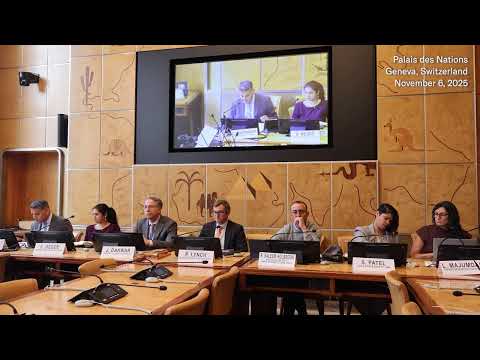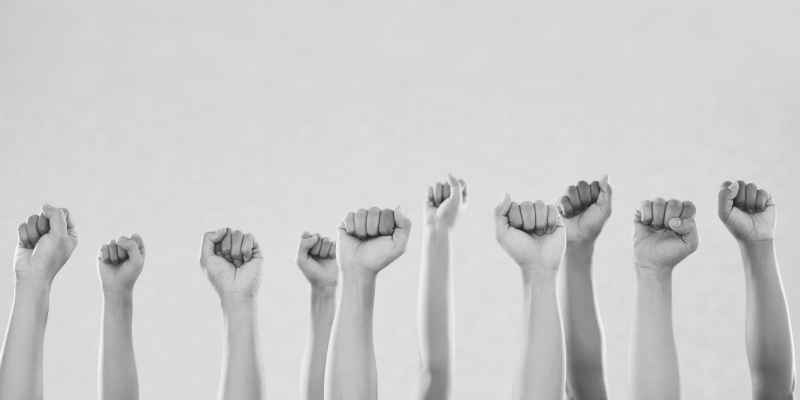This month, for the first time, the U.S. refused to participate in the United Nations Universal Periodic Review (UPR), a process that examines the human rights record of each member state. The Trump administration’s failure to show up to these proceedings reflects the fact that that they are either unwilling or unable to defend their abhorrent human rights record. Although the federal government was not present, we here at the ACLU of Southern California were. I was honored to represent our affiliate in Geneva, Switzerland, where I offered testimony to the UN Human Rights Council regarding human rights abuses in the southland.
We were asked to speak because ACLU SoCal is leading the way in pushing back against the Trump administration’s human rights violations here in Southern California.
In my presentation, I brought attention to three troubling acts by the Trump administration:
1. ICE kidnapping members of our immigrant communities through violent raids
Over the summer, masked heavily armed federal agents invaded neighborhoods across Southern California abducting residents from their homes, workplaces, and public spaces without warrants or identification. The Trump administration ordered the Department of Homeland Security (DHS)— which oversees Immigration and Customs Enforcement (ICE)— to lay siege to the southland under the guise of immigration enforcement. These raids were aggressive, indiscriminate, unconstitutional, and impacted citizens and non-citizens alike. In some instances, agents restrained people with zip ties and transported them using trucks from rental companies.
ICE targeted places with high proportions of people of color, particularly Latino community members, including workplaces such as Home Depot parking lots, garment factories, and construction worksites. The Trump administration has explicitly stated they are using racial profiling to guide their enforcement, and are detaining people “based on their physical appearance.”
The Trump administration set a target to arrest 3,000 people per day across the U.S. Although ICE fell short of that number, it has arrested thousands of people per month in the Southern California region. After taking people into custody, DHS and ICE have at times held them in a federal building basement (B-18) under inhumane conditions, with insufficient access to food, water, beds, toilets, or medical care. In addition, DHS and ICE have consistently refused to provide access to attorneys in their facilities, particularly B-18 and Adelanto Detention Center. ICE has at times refused access to members of U.S. Congress, who have a right to inspect the facilities.
2. Excessive use of force by DHS and ICE against protesters, legal observers and journalists documenting their activity
Immediately after DHS began to increase enforcement, thousands of Southern California residents began rising up to document and protest the raids. Advocacy groups, labor organizations, and civil rights attorneys began organizing emergency legal and humanitarian responses. In the summer and fall, the Southern California community took part in two of the largest mobilizations in U.S. history, protesting the ICE raids and unconstitutional federal response.
In response, federal officers and local law enforcement attempted to suppress the protests with force, shooting at press and protesters with tear gas, pepper spray, rubber bullets, and other weapons. They also arrested hundreds of people, almost all of whom were exercising their rights peacefully.
Prosecutors filed charges against dozens of protesters, often on the basis of false testimony. For example, federal prosecutors are pressing criminal charges against prominent union leader David Huerta for merely attending a protest.
During the protests, federal officers and local law enforcement caused severe and potentially permanent injuries to protesters and members of the press. The violence and baseless charges against protesters were intended to criminalize dissent against the Trump administration and to deter residents from exercising their First Amendment rights by instilling fear of harm or retaliation.
3. Deployment of National Guard and Marines to our Southern California and beyond
Like an arsonist who sets a fire and then calls in the fire department to put out the flames, the Trump administration used the protests of the raids in Southern California as a blatantly false pretext to justify deploying the military into Southern California, federalizing 4,000 California National Guard members and 700 U.S. Marines. The deployment lasted into the summer, but the administration has since withdrawn most of the troops and only 300 National Guardspeople remain.
Our Response
The ACLU has several ongoing lawsuits against the federal government over these three specific sets of human rights violations, particularly Vasquez-Perdomo v. Noem, L.A. Press Club v. Noem, and Newsom v. Trump.
We’re grateful our efforts to fight the current administration’s violence against its own people brought international attention to these issues, and we know the work continues.
The fight for human rights and democracy requires a model of integrated advocacy. To succeed, we must combine litigation with organizing and public policy to fight for freedom, justice, and equality for all people. We understand that this effort requires that we engage in all arenas of advocacy from the state legislature in Sacramento, to the halls of Congress in Washington, DC, to the United Nations.
For over 100 years, the ACLU SoCal has fought for civil rights, civil liberties, and human rights and we will not stop now. We are in solidarity with the thousands of people who protested the violent immigration raids over the summer in Los Angeles, the seven million people who marched in the No Kings rallies in October confronting authoritarianism on our shores, and all others who continue to speak out against this administration’s violence and lawlessness. It will take all of us and we will prevail.


